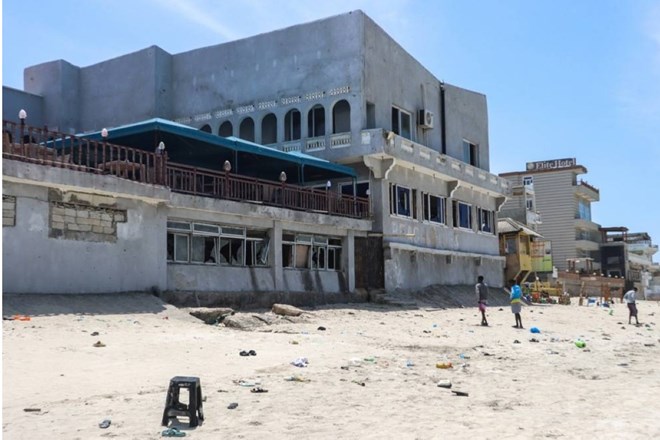
Monday August 5, 2024
People look at the site of a suicide bombing in Mogadishu, Somalia, August 3, 2024. PHOTO BY EPA-EFE/SAID YUSUF WARSAME
Mogadishu (HOL) — The death toll from an Al-Shabaab attack on Mogadishu's Lido Beach climbed to 37 on Sunday, with officials confirming more casualties from the Friday evening assault that also left 212 people injured. The attack marked one of the deadliest recent attacks in the country.
advertisements
The attack began when a suicide bomber detonated a device, followed by gunmen storming the popular Lido Beach area, frequented by business people and government officials. Al-Shabaab, an Al-Qaeda-linked jihadist group, claimed responsibility for the attack on a pro-Shabaab website.Somali Health Minister Ali Haji Adam reported that 11 of the injured are in critical condition, while 137 people with light injuries have been discharged after receiving treatment. The remaining 64 wounded are still in hospital.
Police spokesman Abdifatah Adan Hassan confirmed that security forces ended the assault, killing five gunmen, while a sixth attacker detonated himself at the beach. He noted that the attack targeted not only government officials and soldiers but also ordinary civilians.
In response to the attack, the Somali government arrested several army officers who were on duty at the time. Prime Minister Hamza Abdi Barre announced the arrests, emphasizing that strict measures were being taken to hold those accountable for security lapses. He described the attack as a "barbaric atrocity" against Somali religion and culture, calling for unified support for the victims and ongoing emergency operations.
President Hassan Sheikh Mohamud and Prime Minister Barre convened an emergency security meeting to address the situation and discuss measures to enhance Mogadishu's security. The attack comes after a similar incident in March, when the government arrested 16 people, including a key suspect, for facilitating a deadly attack on an upscale hotel near the presidential palace.
Survivors recounted the horror of the attack. "As we were enjoying our time on the beach, a suicide bomber blew himself up among crowds of people," said survivor Omar Elmi. "Then we could see many people scattered on the ground, including dead, injured, as well as shocked people."
Hassan Farah, another survivor, described the chaos that ensued following the explosion. "I was in the restaurant sipping coffee and having a good chat with friends when I saw a big man running, then there was a huge blast. We were covered with smoke. Inside and outside the restaurant, many people were lying on the floor while others were bleeding and crying."
The recent bombings have also exposed critical blood shortages in Somali hospitals. Medical facilities in Mogadishu are struggling to meet the demand for blood donations during emergencies. Dr. Abdillahi Dahir, administrator of a private hospital, emphasized the urgent need for a national blood bank to address this issue. Hospitals often resort to social media to find urgent blood donors, underscoring the severe strain on resources. The Somali government has previously announced plans to revive the national blood bank, highlighting its critical importance for saving lives during emergencies.